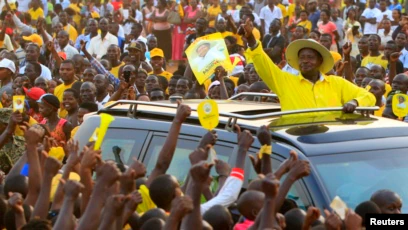Yoweri Kaguta Museveni campaigning
By: Isaac Christopher Lubogo
Thus, when Bobi Wine chants “bw’olaaba umbrella tikinga” (“when you see the umbrella, tick it”), he is not mobilizing faith — he is recycling nostalgia. He forgets that the wind that lifted him in 2021 has long been purchased by the state. The “tikinga” doctrine has decayed into a tragic mantra of misread momentum.
Disclaimer:
This is not be a lament, but a deeply philosophical autopsy of Uganda’s democracy under the shadow of “Protecting the Gains.”
Prologue: A Nation Draped in One Slogan
Every lamppost, billboard, and roadside frame now bears one face — Yoweri Kaguta Museveni, the patriarch of Uganda’s political cosmos. Beneath his portrait, a slogan glows with paternal simplicity: “Protecting the Gains.” It is at once a reminder, a warning, and a declaration of proprietorship. In contrast, the opposition’s silence is not just audible — it is architectural. Uganda itself has become the campaign banner, and the state, the billboard.
When one traverses the political landscape today, one doesn’t merely see campaign materials; one witnesses a cartography of control — an empire of persuasion woven through public institutions, economic dependency, and psychological occupation.
I. The Unequal Plains: Political Geography of Ownership
In every functioning democracy, political visibility is a measure of equity. Yet in Uganda, visibility has mutated into monopoly. Museveni’s presence in the public space is not political communication — it is political colonization. The nation has become his canvas, his color, his slogan.
Meanwhile, opposition banners — particularly those of Bobi Wine and the National Unity Platform (NUP) — appear not as symbols of resistance, but as pockets of tolerated rebellion, confined to the cracks of urban fatigue. The fact that one rarely sees a solitary NUP presidential advert without another candidate clinging to the same post reflects both financial starvation and structural strangulation.

This is not democracy competing; it is democracy surviving.
II. The Illusion of Multiplicity: When All Roads Lead to State House
Uganda’s opposition today no longer constitutes an alternative government; it constitutes an alternative route to the same system. The tragedy is not that Museveni controls the opposition; it is that the opposition has normalized being controlled.
Money, fear, and proximity have replaced ideology. The whispered claim that candidates must pay up to 200 million shillings to associate with certain political figures reveals a commodified politics — where loyalty is auctioned and conscience is mortgaged.
Thus, when Bobi Wine chants “bw’olaaba umbrella tikinga” (“when you see the umbrella, tick it”), he is not mobilizing faith — he is recycling nostalgia. He forgets that the wind that lifted him in 2021 has long been purchased by the state. The “tikinga” doctrine has decayed into a tragic mantra of misread momentum.
III. The Myth of Opposition: Museveni’s Masterstroke
Museveni’s genius lies not merely in longevity, but in strategic individuation — the conversion of a nation into a person and a person into a nation. Uganda is no longer governed through institutions; it is governed through personality diffusion. Every opponent, activist, or critic eventually finds their relevance defined through relation to Museveni — for or against, but always within his gravitational pull.
This phenomenon — the individuation of power — ensures that even the opposition ultimately works to sustain his myth. Those who fight him make him relevant; those who join him make him immortal. Thus, Uganda’s politics has become a one-man dialectic: Museveni versus Museveni reflected in everyone else.
IV. The Political Economy of Control
One cannot analyze Uganda’s electoral theatre without acknowledging the economic mechanics of dominance. Museveni’s machinery is not fueled merely by ideology but by resource capture. State programs, parish development models, youth schemes, and security budgets all feed into a national economy of loyalty. The billboard dominance you observe is not funded by party coffers — it is funded by a political economy of patronage disguised as national development.
The opposition, on the other hand, operates in economic destitution. Their campaigns are not underfunded because the people are unwilling, but because the entire transactional oxygen of politics has been monopolized by the incumbent. When access to money becomes access to politics, poverty itself becomes a political weapon.
V. The Lubogo Reflection: The Empire of the Familiar
Uganda has reached a stage where opposition is no longer dangerous — it is decorative. It offers the illusion of contestation while reinforcing the inevitability of continuity. The tragedy of this era is not tyranny, but tamed tyranny — tyranny so well-blended into the social fabric that citizens no longer recognize its taste.
Museveni’s slogan, “Protecting the Gains,” subtly captures the psychology of this control. It does not promise transformation; it promises preservation — of order, of power, of self. The people are not asked to dream; they are asked to guard. And in guarding, they are enslaved to the very gains that exclude them.
VI. Epilogue: When the Opposition Works for the Same Master
It is no longer a contest between the regime and the resistance. It is a dance between the puppeteer and his shadows. The sad truth is that Uganda’s opposition has been folded into the architecture of the state — willingly or unwillingly, knowingly or unknowingly.
The man who promised to protect the gains has, in effect, purchased the nation’s political soul.
And in this dispensation, elections no longer determine leadership; they merely reaffirm ownership.
Postscript: A Nation Waiting for Silence to End
Uganda’s tragedy is not the power of one man — it is the silence of many who know the truth but have learned to live with it. The campaign is no longer an event; it is a condition. And the ballot, once a voice, has become an echo.








